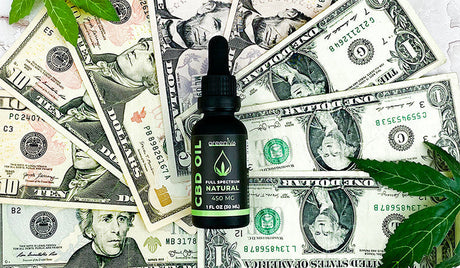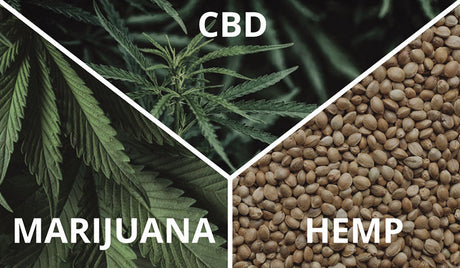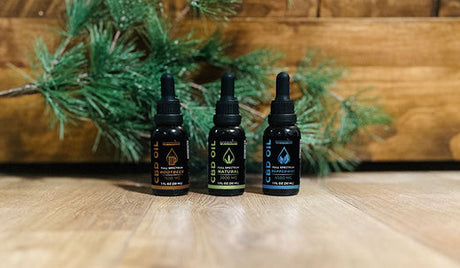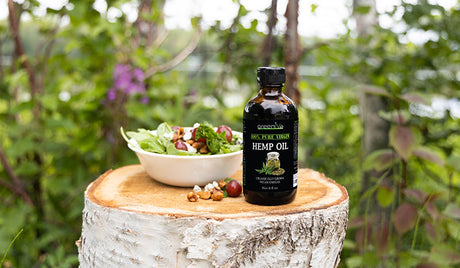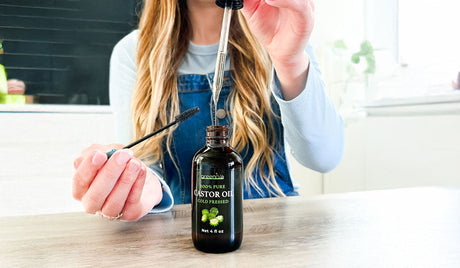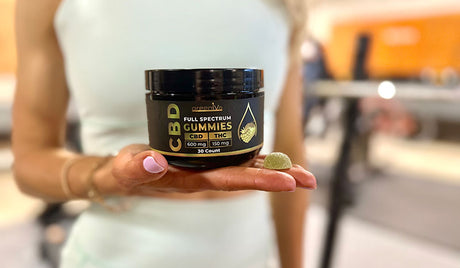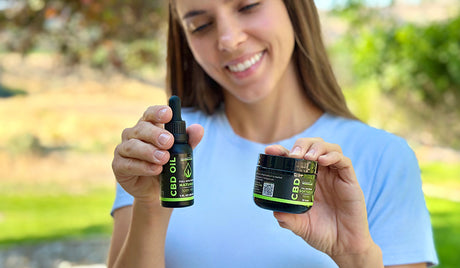THC edibles have quite the reputation, but do CBD edibles have the same reputation? THC and CBD edibles both come from the cannabis plant, and they even have some similar effects. However, when people go to take THC edibles, they are looking to enjoy some type of high, which is the opposite result that you would get from CBD edibles.
In this blog, we go over the basics of THC vs CBD edibles. We will discuss their similarities and differences and what you can expect when taking them. Thank you for coming to our blog. We hope you enjoy the content.
What Are THC Edibles?
Tetrahydrocannabinol (THC), is found in the cannabis plant. THC is most often linked to marijuana. This strain of cannabis produces a large amount of THC. THC is the cannabis by-product that causes a high sensation commonly associated with marijuana.
When ingested, THC interacts with the body's endocannabinoid system by mimicking Anandamide. Anandamide is a natural cannabinoid that makes us happy, and it is often called the "bliss molecule."
THC edibles come in various forms, offering consumers various options. The most popular types include gummies, candy, baked goods, desserts, pills, and softgels. You can easily add THC to almost any form of food.
Effects of THC Edibles
When you consume THC in edible form, it undergoes a slightly different metabolic process compared to smoking or vaporizing it. It takes longer to take effect, often requiring 30 minutes to two hours to feel the full impact. This delayed onset is because of how the digestive system processes the THC.

Once the effects set in, the high can last for several hours. Users often report a sense of relaxation, euphoria, altered perception, and increased appetite. THC also contains other potential side effects.
Legal Considerations of THC
The legal status of THC edibles varies depending on your location. In some states, medicinal and recreational use is allowed; in other states, THC is strictly regulated or prohibited.
Be aware of the laws in your area before purchasing or consuming THC edibles. If you are drug tested regularly, you will test positive for trace amounts of THC.
What Are CBD Edibles?
Cannabidiol (CBD), is another common cannabinoid in the cannabis plant. Unlike THC, CBD is non-psychoactive, meaning it doesn't produce a high like THC. Instead, people know CBD oil for its natural healing properties. CBD is an attractive option for those seeking the benefits of cannabis without the high.
CBD edibles come in various forms, providing users with a convenient and enjoyable way to incorporate CBD into their wellness routine. Like THC, you can easily add CBD to any form of treat or food. CBD edibles come in all sorts; you can find CBD honey sticks, gum, mints, gummies, chocolate, and more!
CBD Edibles Effects
Since CBD doesn't cause a high, consuming CBD edibles won't produce the happy high that THC does. Instead, users may experience a sense of calm, relaxation, and an overall improvement in mood. Additionally, scientists are currently performing studies on CBD to see if it can be used to assist sleep and improve comfort levels. CBD is a great alternative because it has low-risk side effects.

The effects of CBD are low, which include dry mouth, drowsiness, and changes in mood and appetite. Their adverse effects don't often appear unless a large amount of CBD is taken all at once. For example, you would have to take an edible with more than 1500mg to see negative side effects. Most edibles contain anywhere from 5mg to 100mg of CBD.
Legal Considerations of CBD
The legal status of CBD edibles varies by state, and it's important to be aware of local regulations. Federal law does state that CBD with less than 0.3% THC is legal. CBD derived from the hemp plant with less than 0.3% THC is legal in most states.
Most CBD edibles do not contain THC, which makes these edibles safe in all 50 states. Look for terms like full spectrum or broad spectrum. Full Spectrum means that the CBD product contains THC, whereas Broad Spectrum generally means it's THC-free.
Key Differences Between THC vs CBD Edibles
The key difference between THC vs CBD edibles lies in their effects on the body. THC, the psychoactive compound, induces the characteristic "high" associated with cannabis, making it popular for recreational use.
On the other hand, CBD is non-psychoactive and doesn't produce euphoria. Instead, people value it for its potential therapeutic properties, which offer potential relief from symptoms related to sleep, mood, and discomfort without altering one's mental state.

Another critical factor is dosage; THC edibles often require more precise dosing because of their psychoactive properties, whereas a dose of CBD edible provides a wider margin for adjustment.
Additionally, the legal landscape varies significantly between the two cannabis products, with CBD often being more widely accessible because of its non-intoxicating nature and potential health benefits.
Understanding these key distinctions empowers individuals to make informed choices when considering THC or CBD edibles for their specific needs and preferences.
Choosing the Right Edible for You
Selecting the right edible is a highly individualized process that hinges on various factors. Firstly, consider your desired effects and the purpose of incorporating cannabis into your routine. Understanding your goals will help guide your choice between THC and CBD options.
The benefits of CBD include:
- Mood Support
- Improved Sleep
- Discomfort Relief
Additionally, take into account your personal preferences and lifestyle. For instance, capsules or tinctures might be preferable for a discreet and convenient experience. Gummies or candy may be more suitable if you prefer a more leisurely experience.
We recommend factoring in your tolerance level and previous experiences with cannabinoids when buying edibles for the most optimal experience. Beginners may opt for lower potency options, while seasoned users may require higher concentrations.
Consulting with a healthcare professional or a knowledgeable budtender can provide invaluable guidance in tailoring your choice to meet your needs. Remember, finding the perfect edible is finding what aligns best with your preferences and requirements.
Combining THC and CBD in Edibles
In the world of cannabis consumption, the synergy between THC and CBD is a topic of growing interest. When people combine these two cannabinoids in edibles, they can create a unique and potentially more balanced experience.
This phenomenon, often called the "entourage effect," suggests that the combined presence of THC and CBD, along with other cannabinoids and terpenes, can enhance their individual effects. For example, CBD may counteract some of the psychoactive effects of THC, offering a more relaxed and controlled experience.
However, it's important to note that finding the right ratio and dosage is crucial. If you are new to CBD and THC, edibles are recommended to take a small amount at first and then work your way up to a higher dosage. Starting at a high dosage could be potentially dangerous if you are unaware of how your body handles these substances.
Sum It Up!
We feel that it is important to understand the differences between CBD vs THC edibles so you can choose what's right for you. THC is what makes you feel "high," while CBD has potential health benefits without that "high" feeling. The world of cannabis is always changing, but knowing what you're doing is always important.
Think about why you're using it, how much you should take, what kind of edible you want (like a gummy or chocolate), and what you like. This will help you have a good experience with cannabis. Picking either THC or CBD is not what it's all about. We recommend finding what works best for you. Have fun and be smart as you explore the world of cannabis edibles!
GreenIVe Cannabis Products



